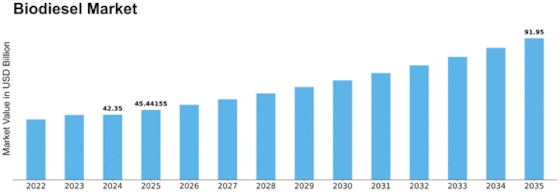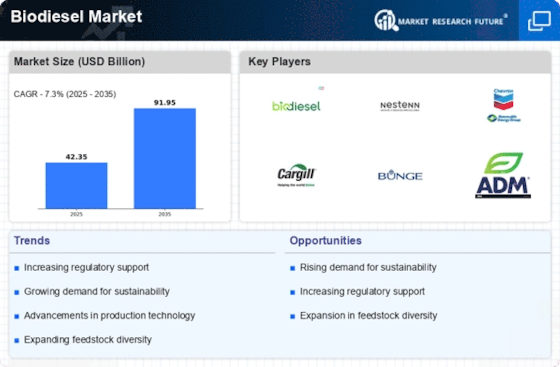Economic Viability
The economic viability of biodiesel is a significant driver for the Biodiesel Market. As fossil fuel prices fluctuate, biodiesel presents a stable and often more affordable alternative. The cost of production has been decreasing due to advancements in technology and economies of scale, making biodiesel more competitive with traditional diesel fuels. Additionally, the increasing availability of feedstocks, such as vegetable oils and animal fats, is further enhancing the economic landscape for biodiesel production. Market data indicates that biodiesel can be produced at a lower cost than in previous years, which is likely to attract more investors and producers to the Biodiesel Market, fostering growth and innovation.
Regulatory Support
The Biodiesel Market benefits from increasing regulatory support aimed at promoting renewable energy sources. Governments worldwide are implementing policies that encourage the use of biodiesel as a cleaner alternative to fossil fuels. For instance, mandates for blending biodiesel with conventional diesel fuel are becoming more common, which is likely to drive demand. In many regions, tax incentives and subsidies are also being introduced to support biodiesel production and consumption. This regulatory framework not only enhances the market's attractiveness but also provides a stable environment for investment in biodiesel technologies. As a result, the Biodiesel Market is poised for growth, with projections indicating a compound annual growth rate of over 5% in the coming years.
Diverse Applications
The versatility of biodiesel is a notable driver for the Biodiesel Market. Biodiesel Market can be utilized in various applications, including transportation, heating, and power generation, making it a flexible energy source. In the transportation sector, biodiesel is increasingly being adopted by fleets and individual consumers as a cleaner alternative to conventional diesel. Additionally, its use in agricultural machinery and as a heating fuel in residential and commercial settings is expanding. This broad range of applications not only enhances the market's appeal but also contributes to its resilience against economic fluctuations. As more industries recognize the benefits of biodiesel, the Biodiesel Market is expected to experience sustained growth.
Technological Innovations
Technological advancements play a crucial role in shaping the Biodiesel Market. Innovations in production processes, such as improved feedstock conversion techniques and more efficient refining methods, are enhancing the viability and cost-effectiveness of biodiesel. For example, the development of advanced catalysts and enzyme technologies has the potential to increase yield and reduce production costs significantly. Furthermore, research into alternative feedstocks, such as algae and waste oils, is expanding the range of materials available for biodiesel production. These technological improvements not only bolster the competitiveness of the Biodiesel Market but also contribute to its sustainability by minimizing waste and maximizing resource utilization.
Rising Environmental Concerns
Growing awareness of environmental issues is a key driver for the Biodiesel Market. As climate change and air pollution become increasingly pressing concerns, consumers and businesses are seeking sustainable alternatives to traditional fossil fuels. Biodiesel Market, derived from renewable resources, offers a lower carbon footprint and reduced greenhouse gas emissions compared to petroleum diesel. This shift in consumer preferences is reflected in market data, which shows a steady increase in biodiesel consumption across various sectors, including transportation and agriculture. The Biodiesel Market is likely to see continued growth as more stakeholders prioritize sustainability in their operations and fuel choices.



















Leave a Comment